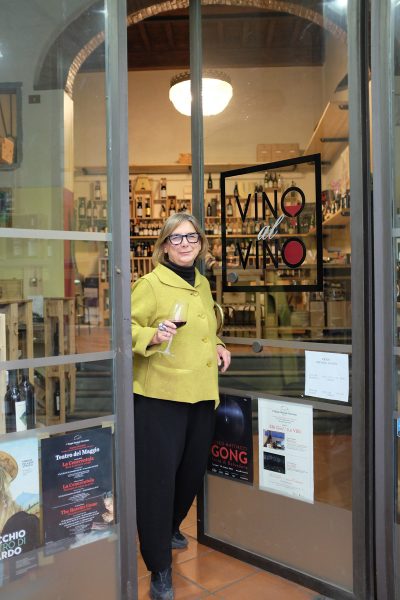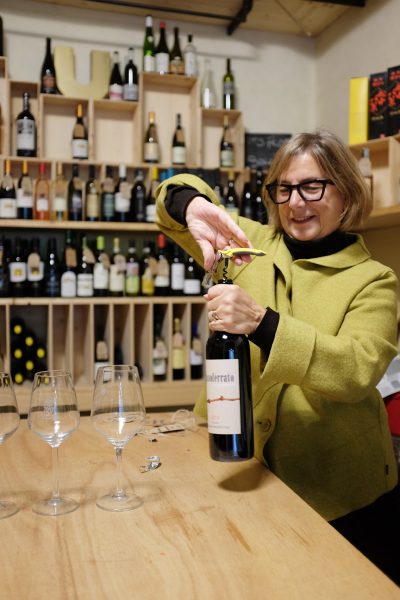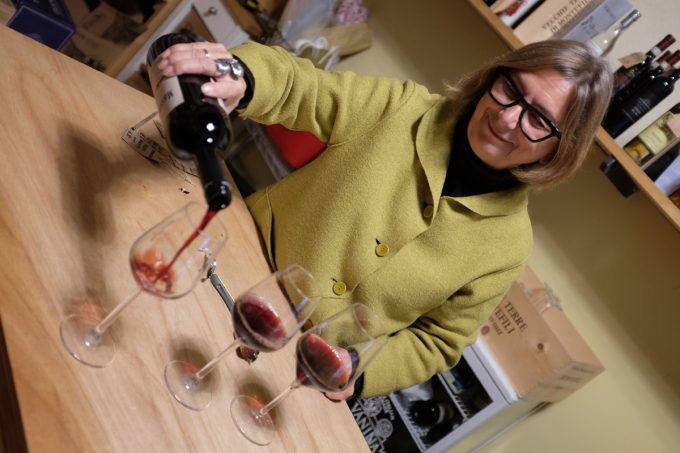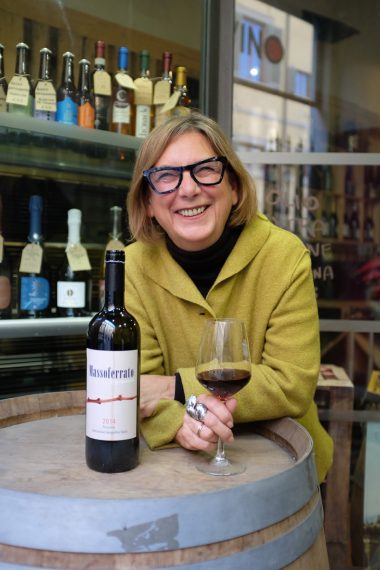There is not much that can faze Carmela Batacchi. Certainly not the questions she’s posed in Vino al Vino, the wine shop she owns on borgo Ognissanti.

Tipsy on Tuscany, a couple walks into the shop. “We’re looking for the wine with the sewing machine on it that we drank in Siena,” says a tall blonde woman. While her tone is friendly, it’s also clear we are expected to know what wine this is and to stock it in mass quantities.
Carmela doesn’t stock anything in mass quantities. What she does do is respond to requests like these by a kind of muscle memory. Unruffled, she picks up her phone, summons an app, and says aloud as she thumbs her screen, “Hmmm… the wine with the sewing machine…”
She squints and flips the screen to face them. “Here it is. It’s Spanish. Might be easier to find it once you’re back home, actually,” she advises altruistically.
They eyeball the other bottles in a cursory search, thank her profusely, and step out. No sale has transpired, but Carmela says pointedly, “You know that’s why I love this place” (disclosure: we are pre-interview friends). “It’s why I opened. The whole world passes through. I get to talk to random people all day.”
National borders have never been much of a barrier in Carmela’s life. Born and raised (partially) in Rutigliano, Puglia, transplanted to New York (the Bronx) at age 11, and back in Italy independently by the time she reached her early 20s, Carmela was formed between two cultures and fortified by a third global community: the high-flying corporate world she exited less than a decade ago. (Her last title pre-technical retirement was Senior Vice President of Global Operations for the American retail giant, Target.)

Carmela describes her family’s transatlantic move as a slow uprooting, with her parents first filing paperwork and exploring the possibility in 1960. “We were part of the ‘last frontier’ of the Italian wave of migration to the States,” she explains. When the move finally came to fruition in 1970, the 11-year-old was resistant. (Her most vivid pre-move memory involves a jovial farewell dinner she spent pouting and refusing to eat her steak.)
Being thrown into Bronx life was a sink-or-swim operation for the family, and Carmela kept well above water. But her Italian language exposure became limited to her parents’ dialect-inflected speech, and by the time Carmela turned 17, the impulse to reconnect with her mother tongue had grown strong. She convinced her strict Pugliese father to allow her to travel to Florence for a month to take Italian courses—“that was a big fight at 17,” she laughs, “but I won it”—and enrolled at EuroCentres in piazza Santo Spirito.
Carmela’s reintroduction to Italy was far removed from her Puglia memories, which seem like scenes plucked from the manual on idyllic Italian childhoods: playing with her brother on the family’s fig tree-shaded terrace, running their own make-believe gastronomia. Florence was busy and thrilling by comparison—“just spectacular,” Carmela says—and the thought that she’d return after university began to tug at her.
Four years at Iona College came and went, and Carmela found her way back to Florence by enrolling in Middlebury College’s M.A. in Italian program. She’d always adamantly refused that she’d ever marry an Italian (“keep in mind, this was based on the boys in the Bronx,” she laughs), so of course that year she met Fabrizio, who’d eventually become her husband. But before the wedding came a series of character-building post-grad interludes: managing a gym on Long Island, selling leather at Parri’s Handbags on via Guicciardini, and distributing her CV nonstop until she nabbed an offer from the Florence office of Allied Stores—the federated group behind such retailers as Bloomingdale’s.
It came with some curveballs. “I was a naturalized US citizen,” Carmela points out, which complicated Allied’s hiring process. With characteristic candor, she quips, “So that’s when I went home and told Fabrizio, ‘I want this job. We have to get married.’”

She held the Allied post for two and a half years before being recruited by Associated Merchandising Corporation, the only import-export company where she hadn’t inquired in those early days of job seeking. (For an amusingly Florentine reason, it turns out: AMC’s offices were across the street from Parri’s Handbags, and since the bosses at each business regularly took coffee breaks together, discretion was impossible.)
The AMC job set Carmela on a dizzying professional trajectory, moving from merchandising to sourcing to systems development. Her clout within the company grew, ultimately leading to her “Target role” (so to speak), and a structuring shift saw her pivot to Hong Kong for three years.
Through all the traveling and ladder-climbing, the familiar, slow-paced Florence served as her homestead. Carmela kept too busy to be more than nominally bothered by cultural clashes, but the question nonetheless asks itself: was this land of family businesses and fixed roles a challenging place to be for an enterprising, upwardly mobile young woman, working for a multinational, hiring and firing at the drop of a hat?
She pauses. “My Florentine husband would come to see me at work and say, ‘This is paradise.’ There was always polemica—not even politics, but polemica—but there was such a good energy because everyone, including the many Italians at the company, got the chance to experience a different way of working,” she remembers fondly. “I really feel fortunate to have had the best of both worlds.”
Multiple “best of both worlds” scenarios are a cornerstone of her biography: she and Fabrizio once entertained the idea of moving to the countryside, a moment she now recognizes as a temporary bout of lunacy (“I don’t drive and would have gone crazy,” she says.) But that fleeting dream of chucking it all for the country culminated with Carmela and her New York siblings planting seven acres of Sangiovese in Impruneta and investing in a family winery, Massoferrato, which produces a range of Toscana IGT wines, including a spring-perfect Rosato. (In a clean full circle, these same wines are served nightly at I Trulli, a New York restaurant owned by Carmela’s brother Nicola and serving, yes, Pugliese cuisine.)
As TF went to press with this profile of Carmela, her brother Nicola’s NYC restaurant, I Trulli, and the siblings’ mother Addolorata were thrown into the international spotlight through this video for Food Insider.
Wine, for Carmela, was the clearest way to stay connected to her international life after her stint in Hong Kong ended in early retirement. Back home, she found herself living in the more insular Florence she’d never experienced, and hungry for cross-cultural interactions without corporate travel’s demands. Already having one foot in the business through Massoferrato, she teamed up with a former junior of hers at AMC; with their apparel-based retail brains, they took the “outlet” approach and applied it to the wine world, selling bargain-priced bottles and cementing their store as a neighborhood hub. Since then, the shop has changed names and gears, choosing to focus on biodynamic, natural and organic wines, but for Carmela, the labels mean nothing if they don’t bring people and cultures together. “That’s really why I’m here,” she says, pouring me another glass.

Q+A
Best bar for an aperitivo?
Le Volpi e l’Uva, for sure. I’ve been going since they opened.
Favorite restaurant in Florence?
Coquinarius in via delle Oche.
The biggest difference between Italians and Americans?
The hours for wine drinking.
Favorite day trip?
Milan or Castiglioncello.
Pet peeve about Florence?
Tourist traps.
One place in Florence that makes you happy or inspires you?
The Bargello courtyard.







